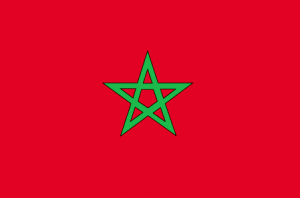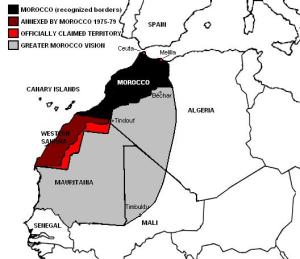
Photo Credit: Google Images
The concept of a “Greater Morocco” began to gain traction in 1956 as Morocco’s postcolonial worldview became fixated on irredentism. The premise behind the idea of a “Greater Morocco” centered on reclaiming old territory that had been broken up by European colonialism. From this perspective the territory of “Greater Morocco” consisted of the western portions of Algeria, most of Mauniteria, and parts of Mail. Therefore, the territory of “Greater Morocco” would stretch from just south of Spain to the borders of Senegal.

Photo Credit: Google Images
How did this vision of a “Greater Morocco” affect the counties behavior during their postcolonial period?
When Morocco gained independence from France in 1956 philosophers and historians such as Allal el-Fassi began writing articles and creating maps demanding the return of territories that were a part of the great shereef dynasties of Morocco. Shortly after, in 1962 when Algeria and Maunituira gained independence, Morocco began engaging in an armed conflict with the former and a diplomatic conflict with the latter, both over territory. It was not until 1969 and 1970 respectively that these disputes were settled by treaties between Morocco and the other two countries affirming the status quo of the inherited colonial borders. In 1975, when Spain was preparing to leave the Western Sahara Morocco quickly mobilized over 350,000 demonstrators to in an attempt reclaim part of the territory that was once part of “Greater Morocco.” Morocco’s aggressive behavior in North Africa has largely been driven by the notion of a “Greater Morocco” and has led strained relations with the rest of the Maghreb.
So has Morocco’s aggressive behavior based on the idea of a “Greater Morocco” been justified?
In terms of Morocco’s claims to the Western Sahara, the International Court of Justice (ICJ) reviewed Morocco’s arguments in 1975. The arguments that Morocco put fourth were based on the links between Sahrawi tribes and the Sultans of Morocco. After close examination of these claims, it was apparent that Sultans administrative power was spotty and did not evenly apply to the entire territory. Each tribe in the Western Sahara had the ability to “opt out” of the Sultans administrative control by refusing to pay taxes. In this context, these tribes were not giving the Moroccan government their constant to be governed, invalidating Morocco’s claims based on Rousseau’s social contract theory.
So if the idea of a “Greater Morocco” is unjustified then what purpose does it serve?
The concept of a “Greater Morocco” appears to serve Moroccan interests for territory and resources. For example in the Western Sahara, which has been under Moroccan occupation since 1975 is a territory that is rich in phosphates and fisheries, that Morocco has continually exploited. Not only has Morocco been exploiting the Western Sahara’s resources they been violating the human rights of the Saharawi people and their right to self-determination. Morocco’s violation of countless international laws for the past 40 years has attempted to use the rhetorical justification of their right to recreate a “Greater Morocco.” Therefore, it is clear that Morocco’s claims to a “Greater Moroccan” identity does not add to well-being of the international community, North Africa, and the Sahrawi people, but only serve Moroccan interests.
